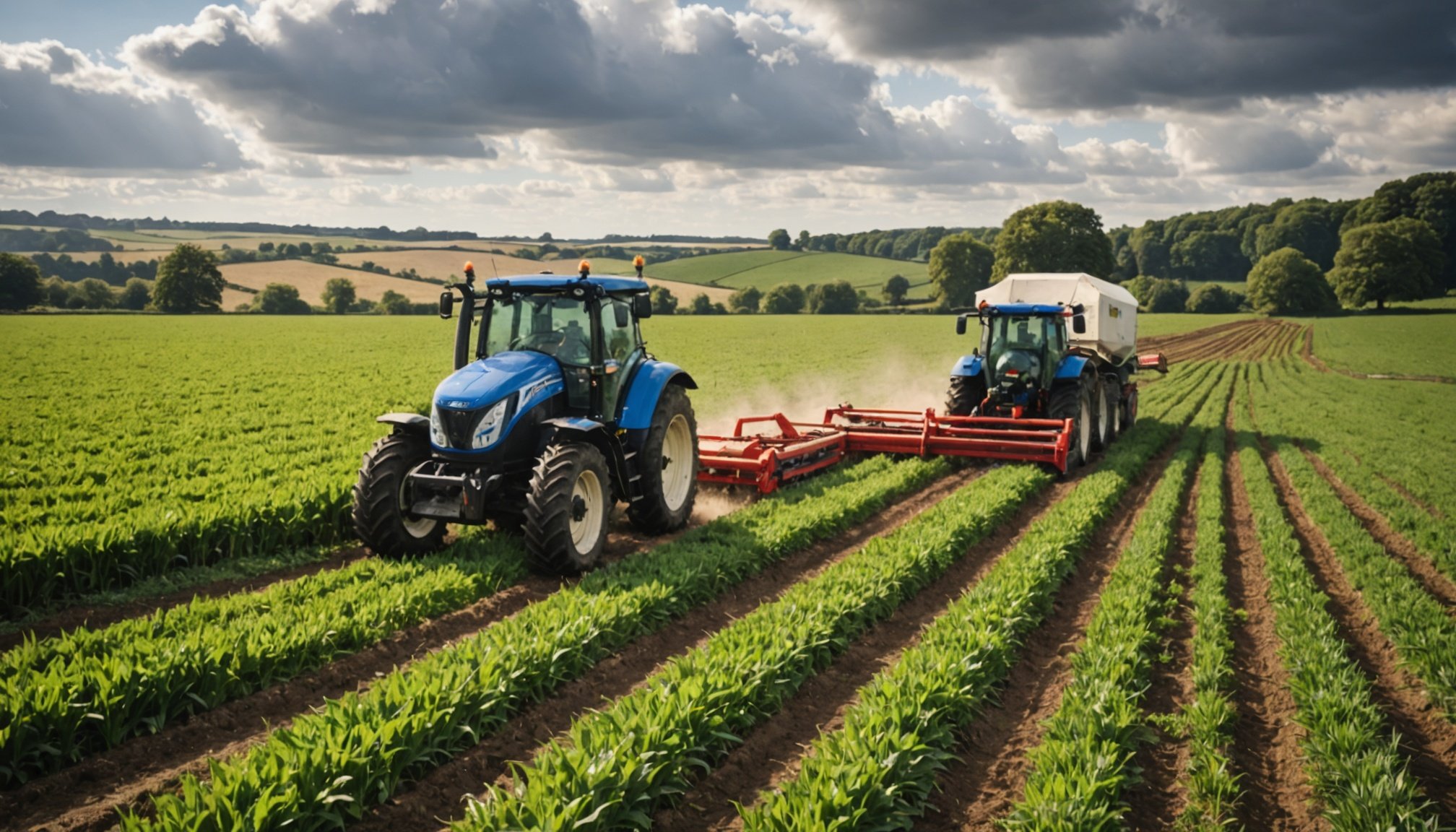Economic Impacts of Brexit on UK Agriculture
The departure of the UK from the European Union has resulted in significant economic changes within the agricultural sector. Changes in agricultural tariffs have notably affected market stability. Pre-Brexit, UK farmers benefited from tariff-free access to EU markets. Post-Brexit, new tariffs have been imposed, creating uncertainty and unpredictability in trade conditions. This has led to fluctuations in pricing and potential market disruptions as UK agricultural production adjusts to altered demand and competition from global markets.
Furthermore, the shift in subsidies and funding has emerged as a primary concern for UK farmers. Brexit necessitated a transition from the Common Agricultural Policy (CAP) subsidies to a domestic agricultural policy. This change raises questions about the continuity of financial support mechanisms that UK farmers relied on. The government has introduced new funding structures, but uncertainties about their long-term stability persist, leaving farmers to face financial challenges in managing resources effectively.
Also read : Harness the Power of Solar Charging Stations to Supercharge Your Electric Vehicle Experience
Inflationary pressures are another consequence of Brexit impacting the agricultural sector. The cost of imported goods necessary for farming has increased due to the imposition of tariffs and changes in import regulations. This escalation affects overall production costs, compelling farmers to explore cost-effective strategies and seek alternative suppliers. Increased input costs without proportional rises in product prices can lead farmers into financial distress, emphasizing the need for adaptive financial planning in their operations.
Trade Implications for UK Agriculture
The UK’s exit from the European Union has brought considerable changes to the trade landscape in agriculture. This section explores the strategic shifts UK agriculture has faced regarding trade agreements, export strategies, and import dynamics.
In parallel : Harnessing AI: Revolutionizing Predictive Maintenance Benefits in the UK Energy Industry
Changes in Export Strategies
Post-Brexit, the UK has had to forge new trade agreements to replace those under the EU umbrella. While some agreements have been established, they are yet to offer the same level of ease and scale as previously enjoyed. One notable challenge faced by UK agricultural exporters is navigating new tariffs and compliance requirements, which have heightened export complexities. This has prompted a need for adaptation strategies to retain competitiveness, such as targeting niche markets in the EU and beyond. There is increased emphasis on high-quality, distinctive products which can capture these specialized markets, offering fertile ground for growth if leveraged effectively.
Import Dynamics
Brexit has altered the landscape for agricultural imports, with new tariffs and import regulations impacting the availability of critical goods like seeds and fertilizers. These shifts have obliged UK farmers to explore domestic sourcing options, which is not only a strategy to mitigate supply disruptions but also helps in curbing inflated costs. Sourcing domestically can enhance resilience against global trade fluctuations, encouraging the development of robust supply chains within the UK. As farmers navigate this evolving landscape, the need for strategic partnerships and innovative solutions becomes paramount in ensuring the sustainable continuation of agricultural production.
Labor Market Shifts in Agriculture
The UK agricultural sector is experiencing significant workforce changes due to Brexit, primarily stemming from new immigration policies. One of the most profound impacts is the shortage of labor, as restrictions on EU workers have heightened. The reliance on seasonal and permanent workers from the EU was substantial, and the reduction in this workforce has exacerbated labor shortages.
Strict visa requirements under revised policies have posed further challenges, limiting the accessibility of skilled and unskilled labor. Consequently, agricultural employment has been directly affected, leading to delays in production cycles and increased operational costs.
To mitigate these disruptions, the industry is exploring strategies for attracting and retaining a skilled workforce. Initiatives to enhance local recruitment and investment in training programs are gaining traction. Furthermore, the agricultural industry is advocating for policy changes to allow more flexible immigration arrangements, ensuring the sustainability of the workforce.
These efforts reflect a proactive approach to adapt to labor shortages by creating a resilient agricultural employment framework, gearing it for long-term stability and efficiency.
Environmental Policies Post-Brexit
The landscape of environmental regulations in the UK has experienced significant transformation post-Brexit. With the nation stepping away from EU mandates, there exists a noticeable divergence in sustainability practices within the agricultural sector. While the EU maintained stringent environmental standards, the UK is now at liberty to redefine these regulations, offering a blend of challenges and opportunities for local farmers.
A prominent opportunity lies in fostering innovation in sustainable agriculture. The flexibility afforded by detaching from EU policies encourages the exploration of home-grown solutions that align more closely with British agricultural ecosystems. This could empower farmers to implement practices tailored to specific environmental conditions and agricultural needs.
Moreover, the role of agritech emerges as an indispensable tool in tackling environmental challenges. Cutting-edge technologies, from precision farming to automated systems, offer transformative potential in enhancing efficiency while minimizing ecological impact. By investing in agritech, UK farmers can better monitor resource usage and improve crop yields sustainably, ensuring resilience in an ever-evolving regulatory landscape.
The onus falls on the government to ensure that these policies not only accommodate innovative practices but also safeguard the environment. Emphasis on collaborative efforts between policymakers, scientists, and farmers will be crucial in developing comprehensive strategies that harmonize productivity with ecological responsibility. Uniquely crafted environmental standards can bolster UK agriculture’s adaptability and competitiveness in a global market palpably shaped by Brexit dynamics.
Funding and Support Mechanisms
The post-Brexit era has ushered in a significant transformation in the landscape of agricultural funding. The transition away from the Common Agricultural Policy (CAP) reforms has incited substantial changes in financial assistance mechanisms, leaving UK farmers to navigate an evolving system of support.
Overview of Funding Changes
The reforms of the CAP have been profound, compelling UK farmers to adjust to a new agricultural funding framework. The UK government’s shift from CAP involves the introduction of tailored funding initiatives designed to cater specifically to domestic agricultural needs. These changes aim to ensure that financial support aligns more closely with the unique challenges faced by local farmers. New funding initiatives, such as the Environmental Land Management Scheme (ELMS), have been introduced to compensate for the loss of EU subsidies.
However, these transitions are complex, and their impact on agriculture is still being evaluated. Key examples of successful funding utilization demonstrate the resourcefulness of farmers adapting to these shifts. Several farmers have capitalized on these new initiatives by integrating sustainable practices and technological innovations into their operations, which aligns with current government priorities.
Future Funding Landscape
Looking forward, long-term funding trends in UK agriculture appear to be heading towards increased emphasis on sustainability and innovation. Farmers are encouraged to navigate diverse support resources and funding applications by leveraging available guidance and advisory services. This proactive approach helps in identifying suitable funding opportunities that align with individual operational goals.
Alternative funding sources, such as partnerships with private investors and participation in research collaborations, are gaining attention as viable avenues to supplement governmental support. These strategies not only provide financial relief but also foster innovation and growth, enhancing the overall resilience of the UK agriculture sector amidst the profound changes driven by Brexit.
Case Studies and Expert Opinions
The journey through Brexit’s challenges has been an eye-opener for many in the UK agricultural sector. Case studies reveal making strategic shifts has been critical. One standout example is a medium-sized farm in Kent that pivoted to organic agriculture post-Brexit. By differentiating its product line and embracing organic certifications, the farm not only mitigated tariff impacts but tapped into niche markets with higher profit margins. This showcases the potential of well-targeted adaptation strategies and how farms can thrive amid evolving conditions.
Expert insights underscore the importance of fostering collaboration among farmers, scientists, and policymakers. Experts advocate for creating support networks that facilitate the exchange of knowledge and resources. This exchange strengthens collective resilience and innovative capacity. Sharing best practices and technological innovations becomes paramount, enabling farmers to respond proactively to ongoing challenges.
Collaboration is key. A panel of experts from leading agricultural universities emphasizes innovative partnerships aimed at research and development. These partnerships have been pivotal, encouraging experimentation with new crops suited to the current market dynamics and ensuring sustainability. Through such collaborative efforts, the UK agricultural sector can build a robust framework to manage the uncertainties of a post-Brexit landscape, fostering both resilience and competitive growth.
Strategies for Overcoming Challenges
The myriad challenges that have arisen post-Brexit require UK farmers to adopt adaptation strategies to ensure their survival and success. Building resilience is key in navigating the uncertainties of this new economic landscape. Farmers are encouraged to focus on strategies that bolster their operational robustness by enhancing flexibility and responsiveness to changing conditions.
Comprehensive Strategies for Building Resilience
Farmers can initiate resilience by investing in diversifying their agricultural practices. This includes integrating multiple crop varieties, which can mitigate risks associated with market or environmental fluctuations. Additionally, harnessing technological innovations like precision farming allows for optimized resource usage and improved productivity.
Identification of Competitive Advantages
For UK farmers, identifying competitive advantages involves pinpointing unique aspects of their operations that differentiate them in an oversaturated market. This can range from specializing in organic produce to adopting eco-friendly and sustainable practices that appeal to environmentally-conscious consumers. By establishing a strong local brand identity, farmers can cultivate customer loyalty and expand their market reach.
Collaboration with local research institutions, such as universities and agricultural bodies, can facilitate access to cutting-edge technology and innovative solutions tailored to the region’s distinctive agricultural conditions. This collaboration ensures that UK farmers remain competitive on a global scale.
Recommendations for Leveraging Technology and Innovation
Leveraging advanced technology is pivotal for farmers aiming to grow amidst post-Brexit challenges. Technologies like agritech and automation can streamline operations, reduce labor dependency, and improve overall efficiency. Farmers are advised to remain abreast of technological advancements and incorporate relevant innovations into their farming practices to maintain a sharp competitive edge.
The strategically targeted application of these adaptive tactics will not only aid farmers in overcoming immediate challenges but also pave the way for sustainable long-term growth in this dynamic and evolving sector.









